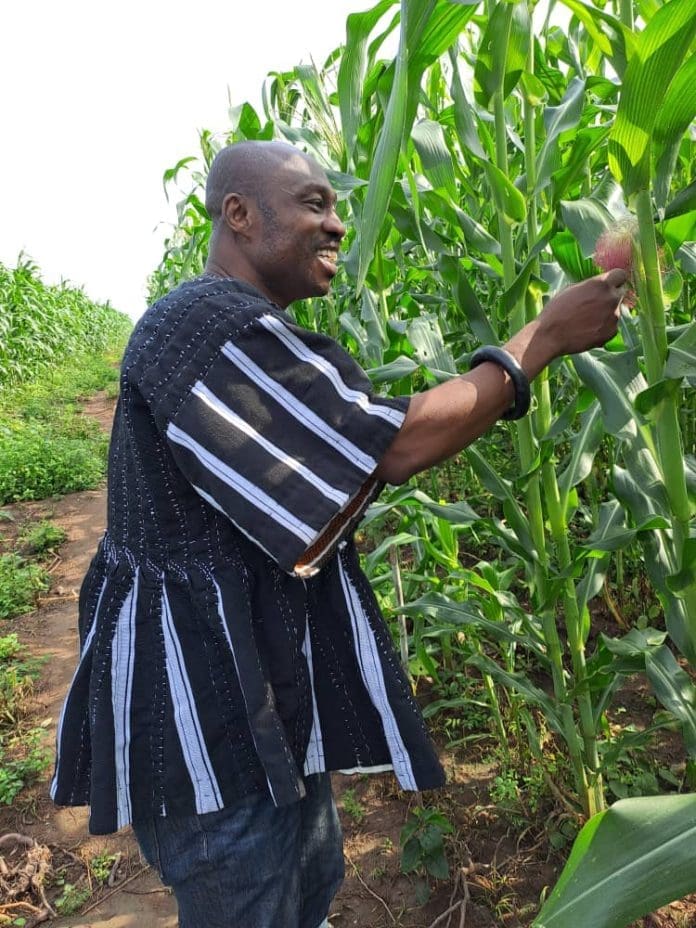A prominent traditional leader in Ghana’s Central Region is positioning the area as a prime agricultural investment destination, leveraging the region’s diverse crop production potential and favorable climatic conditions to attract international capital.
Nana Kumasah Krampah II, Omankrado of Gomoa Asempayin and recently elevated Amankra-Kumahene of the Gomoa Assin Traditional Council, advocates for strategic agricultural investments that capitalize on the region’s demonstrated capacity for high-yield production across multiple crop categories.
The Central Region produces substantial quantities of maize, cassava, plantain, and pineapple, with emerging opportunities in vegetable cultivation including pepper, okra, eggplant, cabbage, and watermelon. Livestock farming potential encompasses sheep and goat rearing, poultry operations, and snail farming, creating diversified investment portfolios for agricultural developers.
Current weather conditions support year-round agricultural activities, with temperatures maintaining optimal ranges between 24-25°C and humidity levels conducive to tropical crop production. These climatic advantages position the region competitively against other West African agricultural zones.
The traditional leader’s investment advocacy aligns strategically with President John Dramani Mahama’s call for development partners to engage as collaborative investors rather than traditional donors in Ghana’s agricultural transformation. This partnership approach emphasizes mutual benefit and sustainable development rather than dependency relationships.
Existing agricultural infrastructure includes support from international development organizations such as MOAP GIZ, World Vision Ghana, and SNV, alongside institutional backing from the University of Cape Coast and the Ministry of Food and Agriculture (MoFA). These partnerships provide technical expertise and capacity building frameworks for potential investors.
The region’s agricultural sector benefits from Ghana’s broader investment promotion initiatives, including the Ghana Agriculture Sector Investment Programme (GASIP) and Ghana Commercial Agriculture Project (GCAP), which provide institutional frameworks for scaling agricultural investments nationwide.
Recent developments demonstrate investor confidence in Central Region agriculture, with companies like Precise AgroProcessing establishing major cassava processing operations including a planned 5,000-acre plantation and 200 tonnes-per-day processing facility at Ekumfi Asokwa.
Nana Kumasah Krampah II’s promotion to Amankra-Kumahene in May 2025 enhances his capacity to facilitate investment partnerships through enhanced traditional authority and community connections. His leadership in the Obrifo Development Foundation demonstrates established experience in attracting private sector partnerships for community development projects.
The investment proposition emphasizes export diversification potential, with Central Region agricultural products capable of serving both domestic and international markets. Ghana’s strategic location provides access to West African regional markets and European export opportunities through established trade corridors.
Agricultural value chain development opportunities extend beyond primary production to include processing, packaging, and logistics operations that can generate employment and add value to raw materials. The region’s proximity to Accra’s port facilities facilitates export logistics for international market access.
The traditional leader’s focus on collaborative development reflects broader trends in African agricultural investment, where traditional authorities play increasingly important roles in facilitating private sector engagement while ensuring community benefits from development initiatives.
Infrastructure development supporting agricultural expansion includes ongoing improvements to road networks, electricity supply, and telecommunications that enhance operational efficiency for modern agricultural enterprises. These improvements reduce operational costs and improve market connectivity for agricultural investors.
The Central Region’s agricultural investment potential represents part of Ghana’s broader strategy to transform agriculture from subsistence-oriented production to commercial, export-focused operations that contribute significantly to national economic growth and rural employment creation.
Source: newsghana.com.gh











